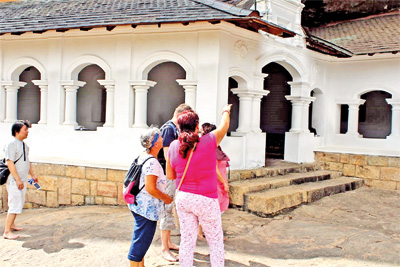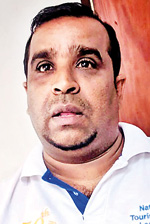News
Certified top tour guides squeezed out of jobs
Licensed tourist guides say they are being driven out of work because tour operators are hiring unregistered guides, in one case a foreign national found spouting nonsense about a treasured piece of Sri Lankan history.

Against the law: A foreign national acting as a tour guide at the historic Dambulla site
A union representing the top tier of tourist guides in Sri Lanka accused tour operators of employing unlicensed tourist guides on lower pay and conditions, destroying the livelihoods of trained and registered guides.
The authorities, however, insist they are taking action to resolve problems and that guides should co-operate.
The union representing the highest-ranking licensed guides, National Tourist Guide Lecturers (NTGL), has 1,825 members registered with the Sri Lanka Tourism Development Authority, many of them graduates fluent in a number of languages, according to NTGL Vice President Sarath Wijendra.
An NTGL guide is authorised to handle an unlimited number of tourists. There are also chauffeur guides, who can take small groups of up to seven tourists, provincial guides, who are allowed to handle tour groups within a specific province, and site guides licensed to work at specific tourist sites.
Mr. Wijendra said tour companies are reluctant to employ tourist guide lecturers since, by law, companies are required to provide them with board and lodging in the same accommodation as the tourists they accompany, and to cover all incidental expenses.
To avoid this, many tour companies had taken to employing either licensed guides from other categories, and even unlicensed guides.
Mr, Wijendra said the daily wage of a tourist guide lecturer has been Rs. 2,500 for many years despite the rising cost of living.
The salary is determined by the Sri Lanka Association of Inbound Tour Operators (SLAITO) which, Mr. Wijendra said, had turned a deaf ear to numerous appeals for a salary increase.
Licensed tourist guides also lack job security due to an absence of an insurance scheme and EPF/ETF benefits, added Manoj Maddage, the NTGL’s Director of Training.

Sarath Wijendra: NTGL Vice President Sarath Wijendra

Manoj Maddage: NTGL’s Director of Training
“Tourist guides in other countries receive far more benefits. Many have insurance schemes. We have nothing,” he said.
“We have members who are still out of work more than five months after the Easter Sunday attacks.
“If we at least had an insurance scheme, members would have had something to fall back on. We have no EPF or ETF benefits or a pension. If we died on our jobs, neither the travel agents nor SLTDA will look into the welfare of our families,” Mr. Madage said.
Mr. Wijendra said his organisation had written to the Tourism Development Authority requesting that the minimum daily wage be increased to $US50 (about Rs. 9,000) which even then, he said, would be lower than the pay of many guides elsewhere in the region.
“We think this amount is fair given that the dollar rate has gone up and local hotel rates and entrance tickets to places have gone up, though our salaries have not,” Mr. Wijendra said.
The sheer number of unlicensed tourist guides is also hitting licensed guides hard as the tourism industry gradually starts to recover from the attacks, the NTGL said.
Of particular concern is the influx of Chinese who work illegally as guides for Chinese tour groups visiting the island.
Mr. Maddage noted that overseas visitors on tourist visas did not have work rights but that many tour companies, especially unlicensed Chinese groups operating in this country, flouted this law.
Other foreign tour groups, too, were breaking the law. The NTGL cited an incident this year when a Slovenian woman was caught working illegally as a tourist guide to a Slovenian tourist group in Sigiriya.
“One of our guides who was nearby could understand the language and was able to listen in. He could make out that the woman did not know anything about Sigiriya and was simply making things up.
“We immediately brought the matter to the notice of the police, who detained her – but they released her after obtaining a statement. No further action was taken,” Mr Wijendra said.
The problems are compounded by the fact that the tourism industry is yet to fully recover from the Easter Sunday attacks, he added. Some guides were still struggling to find regular work.
Mr. Wijendra said it was becoming increasingly difficult for licensed tourist guides to stay in the industry.
The Sri Lanka Association of Inbound Tour Operators (SLAITO) acknowledged licensed tourist guides faced problems but, the association’s head, Kumuda Eramudugolla, said, there were two sides to the story.
“There is a severe dearth of qualified tourist guides in the country. As a result, some companies have taken to employing their own guides. We have asked the Tourist Board to issue temporary passes for such guides,” he said. Complaints about unlicensed tourist guides could be laid before police, he added.
Mr, Eramudugolla said the Tourism Development Authority had not so far recommended a salary increase for licensed tourist guide lecturers.
“Once we get the letter, we can recommend that the companies increase salaries but ultimately it is their decision,” he said.
“We have seen companies pay as much as Rs. 4,500 per day to tour guides depending on feedback by the tourists. It is up to the companies to decide,” he added.
Mr, Eramudugolla agreed that unlicensed tour companies posed a major problem. “Only about 850 travel agents are currently registered with the government. We need changes from the grassroots level to resolve these issues,” he said
The newly-appointed Director-General of the Tourism Development Authority, Chandani Werapitiya, told the Sunday Times that measures were being taken to “turn around the situation”, acknowledging that there were some 20,000 unregistered tourist establishments in the country.
An immediate step would be the deployment this month of several “mobile secretariats” at regional level to resolve matters as they arose. The mobile secretariats will be deployed from December 18 and are initially due to cover Beruwala, Negombo, Kandy, Kurunegala and Dambulla.
“Our aim is to revamp the entire industry with new strategies and it will be a combined effort utilizing all our resources and personnel,” she stressed.
Ms Werapitiya further said the new administration was prepared to meet unions representing licensed tourist guides to discuss their concerns.

